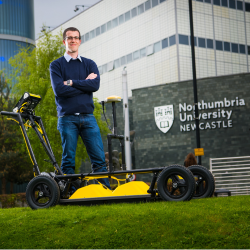-
Study
-
UCAS Clearing 2024
- Clearing Courses
- The Clearing Process
- UCAS Tariff Points
- Clearing 2024 FAQs
- Confirmation
- Clearing Virtual Event
-
Undergraduate
- Search for a Course
- Undergraduate Open Day & Events
- Application Guides
- Northumbria University UCAS Exhibitions
- Foundation Years
- Undergraduate Fees & Funding
- School & College Outreach
- Continuing Professional Development
-
Postgraduate
- Postgraduate Study Degree
- Postgraduate Research Degrees
- Postgraduate Open Days and Events
- Postgraduate Fees & Funding
- Flexible Learning
- Thinking about a Masters?
- Continuing Professional Development
- Change Direction
-
Student Life
- The Hub - Student Blog
- Accommodation
- Life in Newcastle
- Support for Students
- Careers
- Information for Parents
- Students' Union
- Northumbria Sport
-
-
International
International
Northumbria’s global footprint touches every continent across the world, through our global partnerships across 17 institutions in 10 countries, to our 277,000 strong alumni community and 150 recruitment partners – we prepare our students for the challenges of tomorrow. Discover more about how to join Northumbria’s global family or our partnerships.
View our Global Footprint-
Applying to Northumbria
- European Union
- Our London Campus
- Northumbria Pathway
- International Events
- Entry Requirements and Country Representatives
- Regional Offices
-
Northumbria Language Centre
- Faculty Requirements
- Acceptable English Requirements
- Pre-Sessional English and Study Skills
- Academic Language Skills Programmes (ALS)
-
International Fees, Funding & Scholarships
- International Undergraduate Fees
- International Undergraduate Funding
- International Masters Fees
- International Masters Funding
- International Postgraduate Research Fees
- International Postgraduate Research Funding
- International Money Matters
-
Life at Northumbria
- International student support
- Careers
-
International Mobility
- Current Northumbria Students
- Incoming Exchange Students
-
-
Business
Business
The world is changing faster than ever before. The future is there to be won by organisations who find ways to turn today's possibilities into tomorrows competitive edge. In a connected world, collaboration can be the key to success.
More on our Business Services -
Research
Research
Northumbria is a research-rich, business-focused, professional university with a global reputation for academic quality. We conduct ground-breaking research that is responsive to the science & technology, health & well being, economic and social and arts & cultural needs for the communities
Discover more about our Research -
About Us
-
About Northumbria
- Our Strategy
- Our Staff
- Place and Partnerships
- Student Profiles
- Alumni Profiles
- Leadership & Governance
- Academic Departments
- University Services
- History of Northumbria
- Contact us
- Online Shop
-
-
Alumni
Alumni
Northumbria University is renowned for the calibre of its business-ready graduates. Our alumni network has over 237,000 graduates based in 178 countries worldwide in a range of sectors, our alumni are making a real impact on the world.
Our Alumni - Work For Us
What will I learn on this module?
“Field Notes” will take you out of the classroom to immerse you in the major issues facing the contemporary world. The North East is a region alive with controversy and contested spaces which speak to larger challenges facing the nation and the global community in the 21st century. Landscapes throughout the region, from the coast to the Northumberland National Park, Newcastle city centre to the banks of the River Tyne, are inscribed with complex histories which intersect with, and inform, ongoing battles over how to manage, protect, and develop these spaces for a future informed by severe social and economic challenges and the upheaval caused by climate change. You will be taken to four different local sites that are at the centre of these larger environmental-social-political and economic battles and learn how to unravel the complex dynamics that underpin these spaces (from the choices made by policy makers at the local, national, and global level, to the role of communities, activist groups, and other stakeholders in shaping these places). You will be asked to complete a range of assessments from a group presentation to a public poster and site report responding to these field trips. Through the module, therefore, you will be taught how to understand the dynamics of place and policy making and most importantly how to apply historical research to contemporary social issues that impact our world today.
How will I learn on this module?
This module will adopt a diverse set of teaching methods. Four field trips will immerse you in case studies and the concept of learning in place. Each field trip will be preceded by a workshop where you will be introduced to the broader context and background surrounding each site. These workshops will be grounded in a body of set reading (available via the electronic reading list) and will involve small group work and larger group discussion. Each field trip will also be followed by a review session where you will develop observations necessary for completing the module assessments. You will receive formative feedback throughout the learning process (in both the workshops and in the review sessions) and the summative assessment will match your learning against the learning outcomes for the module.
How will I be supported academically on this module?
Your academic development will be supported through your module tutor, engagement with your peers, and through the programme leader. The module tutor will be accessible within publicised Feedback and Consultation hours and via email. Your peers will provide you with a collaborative learning environment, and your programme leader will guide you through the requirements and expectations of your degree programme, of which this module is part. You will also be supported through individual engagement with the academic literature, lectures, and resources available on the eLP. Formative feedback will be on-going through seminar activities and assessment tasks.
What will I be expected to read on this module?
All modules at Northumbria include a range of reading materials that students are expected to engage with. The reading list for this module can be found at: http://readinglists.northumbria.ac.uk
(Reading List service online guide for academic staff this containing contact details for the Reading List team – http://library.northumbria.ac.uk/readinglists)
What will I be expected to achieve?
Knowledge & Understanding:
1. Knowledge and understanding of how environments are created, and the forces that shape them over time
2. An appreciation of the complexity around current environmental, social and political challenges faced in the North East
Intellectual / Professional skills & abilities:
3. An appreciation of how history can inform policy-making, and impact contemporary issues
4. Learn how to communicate research to a policy and public audience
5. Demonstrate a range of transferable skills, including the ability to make independent critical judgements, to critically evaluate sources, to summarise the research of others, and to present arguments in a cogent and persuasive way
Personal Values Attributes (Global / Cultural awareness, Ethics, Curiosity) (PVA):
6. Awareness of and sensitivity towards different social groups and interests
7. Engagement with ethical questions concerning the environment and climate change, and how they can be translated from historical to contemporary contexts
How will I be assessed?
1 x 1000-word Reflective Journal (weighted 25%).
This journal will be completed during the field trip and will outline initial reflections to the environment/setting.
Group Presentations (weighted 25%).
Each group will develop a presentation related to a fieldtrip.
1 x A3 Poster (weighted 25%).
This poster will summarise the findings of a fieldtrip and present it in a way legible to a public audience.
1 x 1000-word “Site Report” (weighted 25%).
This policy report will provide an in-depth assessment of a fieldtrip based on archival and secondary research.
Formative feedback for each assessment will be provided in seminars.
Pre-requisite(s)
N/A
Co-requisite(s)
N/A
Module abstract
“Field Notes” will take you into the field to immerse you in the major issues facing the contemporary world today. The North East is a region alive with controversy and contested spaces which speak to larger challenges facing the nation and the global community in the 21st century. You will be introduced to four different local sites that are at the centre of these larger environmental-social-political and economic battles and learn how to unravel the complex dynamics that underpin the spaces in which we live (from the choices made by policy makers at the local, national, and global level, to the role of communities, activist groups, and other stakeholders in shaping these places). Through the module you should better understand the dynamics of place and policy making and most importantly, how to apply historical research to contemporary social issues that impact our world today.
Course info
UCAS Code T720
Credits 20
Level of Study Undergraduate
Mode of Study 3 years Full Time or 4 years with a placement (sandwich)/study abroad
Department Humanities
Location City Campus, Northumbria University
City Newcastle
Start September 2024 or September 2025
All information is accurate at the time of sharing.
Full time Courses are primarily delivered via on-campus face to face learning but could include elements of online learning. Most courses run as planned and as promoted on our website and via our marketing materials, but if there are any substantial changes (as determined by the Competition and Markets Authority) to a course or there is the potential that course may be withdrawn, we will notify all affected applicants as soon as possible with advice and guidance regarding their options. It is also important to be aware that optional modules listed on course pages may be subject to change depending on uptake numbers each year.
Contact time is subject to increase or decrease in line with possible restrictions imposed by the government or the University in the interest of maintaining the health and safety and wellbeing of students, staff, and visitors if this is deemed necessary in future.
Useful Links
Find out about our distinctive approach at
www.northumbria.ac.uk/exp
Admissions Terms and Conditions
northumbria.ac.uk/terms
Fees and Funding
northumbria.ac.uk/fees
Admissions Policy
northumbria.ac.uk/adpolicy
Admissions Complaints Policy
northumbria.ac.uk/complaints














